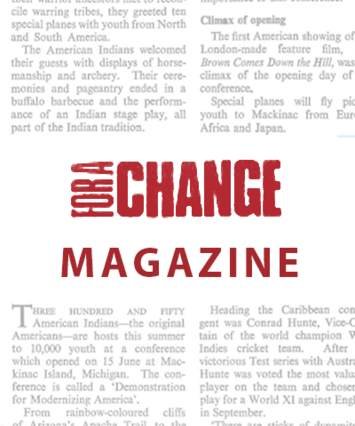South Africa is in a state of deep unrest. Recently there has been a hardening polarization of the extremes of both right and left. But there is a hopeful aspect, a quiet revolution which is going on in the hearts, minds and attitudes of South Africans of all backgrounds and persuasions.
On a recent visit I was fortunate to meet people in the forefront of this quiet revolution, the courageous and creative minority which is always the seed-bed of societies yet to be. The 'movers and shakers' include academics and students at Stellenbosch University, cradle of Afrikaner leadership, who have publicly taken a stand for a nonracial society; the General Synod of the Dutch Reformed Church, who have declared racism to be theologically unacceptable; young radical blacks who have returned to school under the slogan 'education for liberation'; young white business people who are devoting time, money and energy to the education and training needs of blacks in their areas; Indian trade unionists organizing for the rights of blacks.
A multiracial conference sponsored by Moral Re-Armament, held over a July weekend at the University of the Orange Free State in Bloemfontein, gave an insight into the growth of a new South Africa. Border guards held up the Swazi delegates for 45 minutes, refusing to believe that they were to stay at an Afrikaner university. They joined black, white, yellow and brown South Africans, rural and urban, young, middle and old, wealthy and poor, who were meeting to look for values upon which to build the future.
A leading black teacher spoke of his three-cornered tussle between his own work for a country of equal opportunity and equal education, the potentially destructive anger of his association members at the slowness of progress towards this goal, and the stubbornness of officials determined to have events ordered in their own way. An Afrikaner student stood up, barely able to speak: 'I don't know if I can say this, and even if I do it is only words - but I am truly sorry for what my people have done to black education, and I will do what I can to put it right'
An ex-Rhodesian policeman, injured in the bush war, recounted a conversation with a black man at a reception: 'But for Moral Re-Armament, I wouldn't be seen dead talking to a white man' - 'Up to this moment I wouldn't be seen dead talking to a black man.' He then asked forgiveness of the blacks for the hatred, bitterness and frustration he had brought to South Africa, and said that his family were now committed to the road of reconciliation. A black woman invited him to her township to meet her people.
A young black man from Soweto described his physical hurt when soldiers attacked him unjustly, and his inner hurt at the shock this had caused his mother. A black teacher rose: 'Forgive them. They are also frightened. I pray for everyone in South Africa, and I also pray for them.' A white mother told of her soldier son in a township sharing his breakfast with a small black child. 'Yes,' she said, 'Pray for them.'
Young men and women from Stellenbosch and Soweto stood together on the platform. A Stellenbosch student said, 'I think we should sing "Nkosi Sikelele Afrika". If you start, those of us who know it can join in.' The audience rose to their feet, and the anthem rolled out. Later a black man got up: 'I think we should all sing the South African national anthem. I used to hate it. Now I think we should sing it together.' Everyone sang. Except for one young man from Soweto, who quietly slipped out before the singing began and as quietly returned when it was over.
Determination and hope are twins, and together are in the long run invincible.


